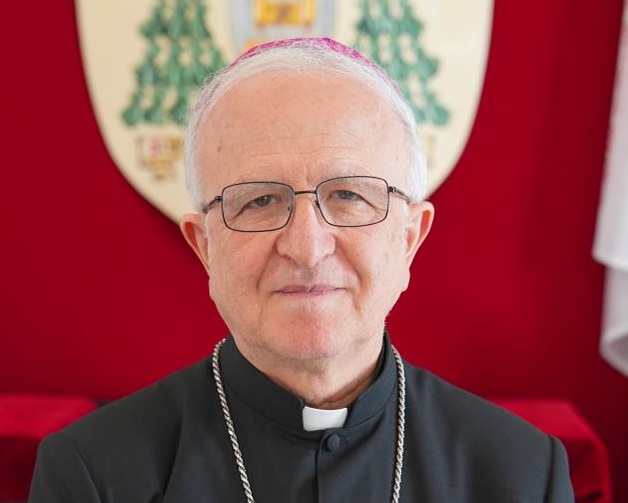Bishop Shomali: Jordan’s solidarity with Gaza, but relations with Israel remain fundamental
The auxiliary bishop of Jerusalem and patriarchal vicar for Palestine looks at the protests in Amman. Diplomatic relations with Israel allow aid to be sent to Gaza. Some students from Gaza’s Holy Family Parish arrived in Amman thanks to the Patriarchate’s support. Pope Francis “is the only balanced voice.”
Rome (AsiaNews) – In Amman, protests that began on 24 March continue in front of the Israeli embassy, which has been closed for months.
Protesters are demanding the government scrap the peace treaty with Israel signed in 1994, accusing Hashemite authorities of not doing enough for the suffering people of the Gaza Strip.
“Protesters in Jordan are a minority," said Mgr William Shomali, auxiliary bishop of the Latin Patriarchate from Jerusalem. “They are calling for the opening of a border with the West Bank, so that they can support Hamas guerrillas. That can't be done."
Most Jordanians are in fact satisfied with the actions backed by King Abdullah II in recent months. The ongoing protests in the capital have no equivalent in any other Arab country.
Many Jordanians are of Palestinian origin, whose families fled Palestine between 1948 and 1967, who feel the anguish of their Gazan “brothers” as their own.
While Iran threatens actions against Israel following the raid on the Iranian embassy in Damascus, Shomali says Jordan would not support any such offensive.
For the prelate, “It is hard to predict a development in this regard. Iran could carry out a response, as could its satellites, the Houthis in Yemen and Hezbollah in Lebanon. It is unlikely to come from Jordan though, which does not have good relations with Iran.”
Street protests are also being fuelled by the country’s economic woes. “International aid (US$ 1.5 billion from the US per year) is not enough to support all the refugees the country has taken in from Syria, Iraq and Palestine itself.”
“Tourism is also declining in Jordan, like in the rest of the Middle East. The lack of oil also has an influence,” said Bishop Shomali, a former vicar for Latin Catholics in Jordan.
Diplomatic relations with Israel are thus crucial. They are also needed to continue to provide aid to the Gazan population, as well as facilitate the evacuation of people with a residence permit in the Hashemite Kingdom.
“It is thanks to the continuity of ties with Israel that every two days Jordanian planes fly over Gaza dropping food and medicines. None of this could be done with the interruption of relations.”
Jordan’s solidarity with the Palestinian people living in Gaza also involves the country's Catholic communities, close to the Holy Family parish in Gaza even before 7 October.
“They organised a fundraiser. Even if what they raised is not much, it is a great expression of closeness. Many Christians come from Jerusalem, Bethlehem, some even from Gaza," he added.
Some Gazan students attend the American University of Madaba (AUM) in Jordan, a university established by the Latin Patriarchate.
“Today, five of them crossed the Rafah Crossing. They will fly from Cairo to Amman, after seven months of absence. They are very good students; We offered them scholarships; we are very satisfied with the result," he added.
Some 20 other people reached the crossing on a bus with them.
The Latin Patriarchate of Jerusalem is playing two roles at this time of crisis: spiritual and humanitarian.
“We pray for peace. We believe in the power of prayer, even if for now it has not borne all the fruits we desire," the auxiliary bishop told AsiaNews.
Above all, the patriarchate is deploying all possible resources to mitigate the humanitarian needs of the Holy Family community in Gaza, which currently hosts 100 Catholics, plus 480 more, mostly Orthodox. Many were evacuated, while others lost their life.
"Thanks to donations from all over the world at the start of the crisis, we were able to send them a large sum of money when the banks were open. With this money, they can buy food," he said.
In fact, although humanitarian aid dropped from planes in recent weeks comes from donations, it is often collected by people who then sell them to the detriment of the most fragile sections of the population.
"Yesterday our parish bought a thousand frozen chickens, to be consumed shortly before the expiry date. About 80,000 shekels (about US$ 21,000) were paid, a large sum. It is about ten times the normal price, but there is no alternative now to feed the faithful. Some mothers are breastfeeding; children have to grow up. Bread, which fortunately is not in short supply, is not enough.”
Tie Christian community has shown steadfast faith even during the Easter season. "The parish continued the liturgy throughout Lent; together with Catholics, the Orthodox also participated; we saw many photographs," Shomali said.
“They sang hallelujah amid the bombing. This is a paradox. Singing hallelujah, lighting the Paschal candle in the middle of a war where people are dying, or are dressed in black because of mourning. This is our faith."
Now people hope to see Easter’s message of peace, celebrated despite the war, translated into deeds. In this sense, the words of Pope Francis are of great comfort.
“He keeps saying that every war is a defeat. No one can claim to gain from it. He calls for a two-state solution. He is the only balanced voice," the bishop said.
The pontiff “often calls our community in Gaza, which is beautiful. It shows closeness, but he also teaches the world a lesson: You can't leave this small community alone.”
16/05/2018 19:28







.png)










